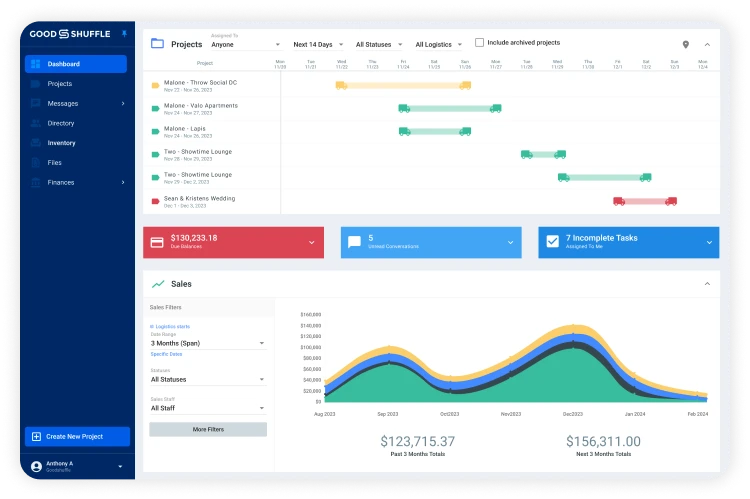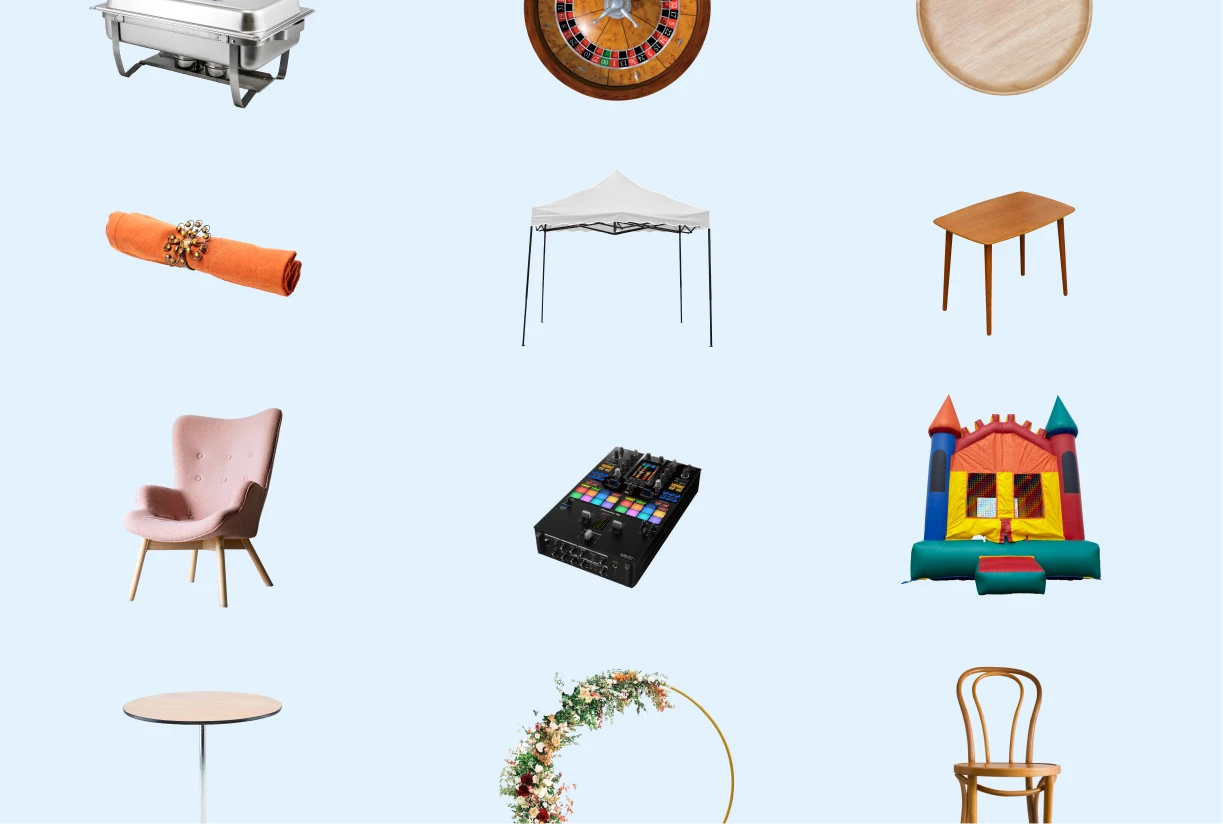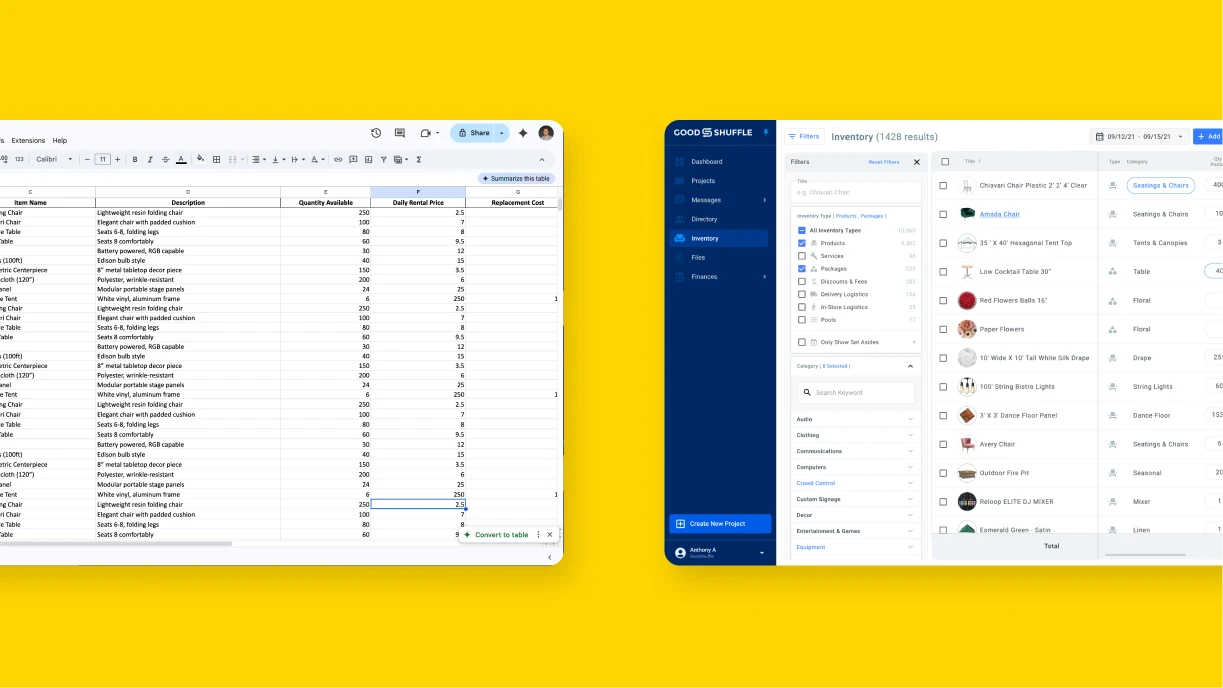Table of Contents
-
Decide What Type of Event Rental Company You’ll Run
-
Pick a Niche: How Will You Add to the Market?
-
Develop a 30-60-90 Day Party Rental Business Plan
-
Network with Other Event Professionals and Join Industry Organizations
-
Sort Out All of Your Legal Business
-
The First Month Checklist: Get Your Business Up and Running
-
Use Event Rental Technology to Grow Your Event Rental Company
If you’re wondering how to start a party rental business, you’ve come to the right place.
Over the past decade, we’ve just about seen it all — natural disasters, a global pandemic, you name it. Despite it all, the party rental industry has emerged stronger than ever, armed with sturdier infrastructure, more creative themes, and new technologies.
If you’re not already convinced that the events industry is for you, you should know that, according to Bizzabo, the industry is expected to grow 11% (up to $1,553 billion) by 2028.
Whether you want to start a party rental business out of your garage or dive full-force in and buy a warehouse, here are the seven steps to starting a successful event rental business. We’ll even throw in a free business plan template and actionable tips from seasoned industry experts.
Decide What Type of Event Rental Company You’ll Run
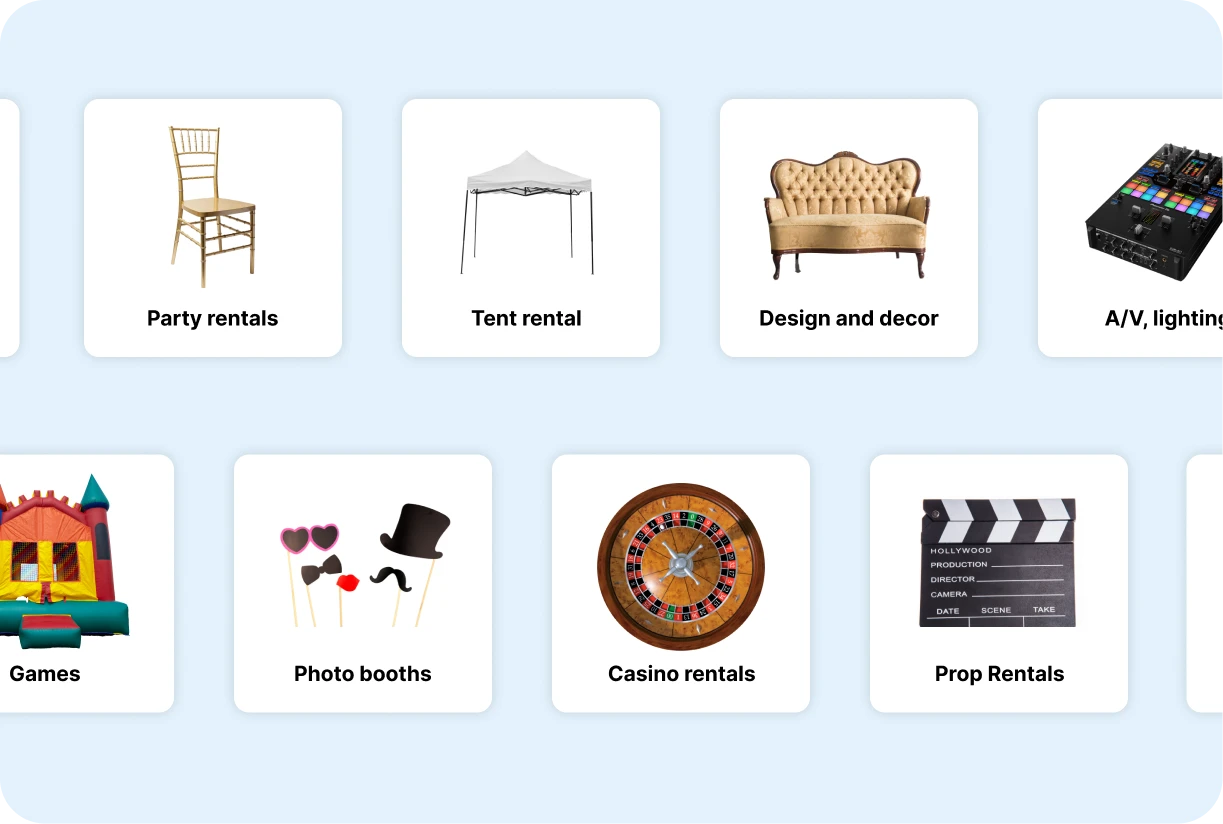
So you’re eager to dive into the world of events — it’s an exciting industry with a global market value of $1.19 billion as of 2022. But before you start telling all your friends and family that you’re open for business, it’s important to understand how you’ll fit into the industry.
Will you be creating floral centerpieces for your town’s most extravagant weddings? Or will you be renting out vintage arcade games for corporate events?
Many party rental companies choose to mix and match, but here are the main types of party rental businesses:
Party rentals
From tables to chairs to linens, general party rental companies are the backbone of the event industry. They provide the essential pieces that bring visions to life, and are often a one-stop shop for busy customers. After all, clients always need spaces to sit and eat.
General event rental companies do well with all kinds of events, from graduation parties and mitzvahs to weddings and corporate events. Many individuals also start out in the general event rental space, then choose to specialize later on as their business expands — often based on client demand and individual interests.
Tent rental
There’s nothing quite like a tented wedding or a music festival with a bit of shade to keep everyone cool. That’s where tent rental companies come in. There are a variety of tent types you can rent out — whether it’s sleek marquees for elegant weddings, pop-up tents for lively fairs, or rugged frame tents for corporate gatherings — to cater to every client’s dream (as long as you have the space to store them, of course).
Learn more about how to choose the right tent for your event business.
Design and decor
If you’re looking to get more creative in your event services, you may consider starting a custom design and decor event company. This includes everything from vintage rentals, to tabletop items, to truly custom pieces. You may have a more specific target market or specialize in higher-end events such as weddings.
Learn more about how to start a vintage rental business.
A/V, lighting, and production
Did you have a blast doing the lighting for your high school play? You may have found your calling as an event design and production company. Some clients, like those who host corporate events and weddings, go all out with event lighting, audio and video systems, and event staging and design.
The trickiest part of running this kind of company is making sure you have a team of experts, such as lighting and sound technicians. If you do have the expertise, you’re likely to get lots of bookings because these businesses partner well with other vendors, too.
Learn more about how to become a preferred vendor of a venue.
Games, entertainment, and inflatables
You want to get into the party rental business to bring the fun. What better way to do so than as a game rental, entertainment, or inflatables business? These businesses often rent out large arcade games, basic backyard fun like corn hole, or inflatables that get the good times rolling — remember moon bounces? Lots of these events are outdoors, so you may also consider investing in tent rentals to ensure your business isn’t so strongly affected by seasonality.
Photo booths
What wedding, corporate party, prom night, or other celebration isn’t made better by a way to capture all the memories? Starting a photo booth rental company is great for creative entrepreneurs, especially because lots of photo booth rental pros build their own pieces.
Photo booths can be as simple or as complex as you’d like. For a high-end option, consider an enclosed booth featuring a DSLR camera, professional lighting, customizable backdrops, and instant printing capabilities. On the simpler side, an open-air setup with a basic digital camera, a backdrop stand, and a tablet for photo viewing and sharing can provide a more budget-friendly yet still enjoyable experience for guests.
There’s also always new technology rolling out in camera-land, from 360-degree photo booths to virtual reality event experiences to selfie stations. If you have a background in photography or enjoy staying on top of the latest trends, renting out photo booth equipment and attendants could be a great business opportunity for you.
Casino rentals
Casino-themed events and rentals are incredibly popular. Even if you don’t serve the Las Vegas region, you can still bring a little bit of Vegas to your clients. Lots of casino rental pros target corporate clients, who love all games, from poker, craps, and roulette, to slot machines and money wheels. Casino-themed rentals are also a great opportunity for selling packages that include the equipment, the set-up, and the dealer.
Other specializations
The list of event rental companies doesn’t end there. Some event professionals offer specialty rentals in everything from:
- Yard card signs
- Vintage prop rentals
- Portable toilets
- Dance floors
- Balloons
…and on and on. The event industry is huge, and the possibilities are endless.
Pick a Niche: How Will You Add to the Market?
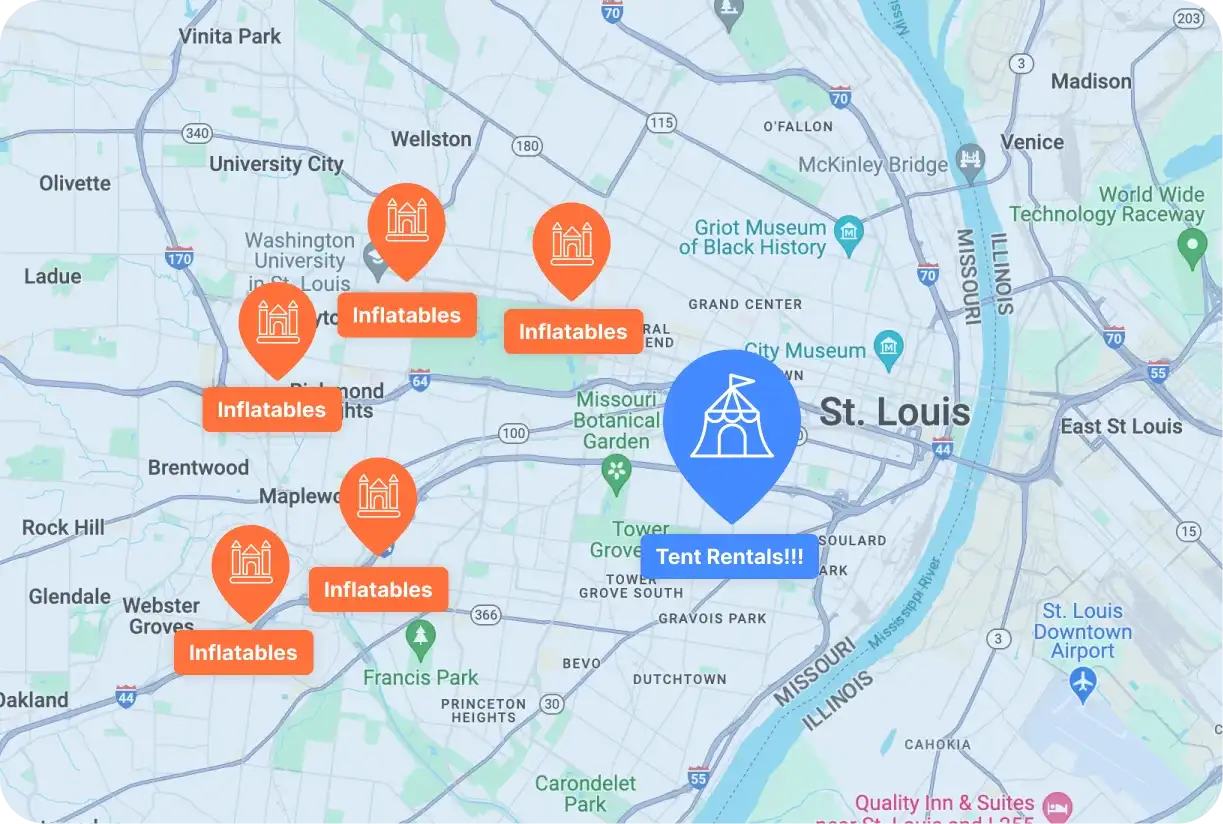
We hear all the time that the event industry is oversaturated. If there are three other inflatables companies in the same area, why join the mix?
This is a big myth we’re busting right here and now. People have been saying the same things about podcasts and social media influencers for years, yet those who offer unique value, creativity, and exceptional service continue to thrive.
Sure, it’s easy to get started in event rentals and anyone can be a customer, but that’s also a huge advantage for you. If you’re savvy about collecting information on client demand (more on that later), provide superior customer service, and find a good niche in the market, you’ll have no shortage of clients knocking at your door.
Conduct market research
Market research involves scoping out your target audience and the local market to understand how you best fit into the space.
This will also give you time to analyze what works for your competitors in terms of pricing, services, and operations. From there, it’ll be easy for you to identify what makes your new party rental business unique.
You’ll want to ask yourself questions around customer insights, competitive analysis, market positioning, pricing and revenue, and more. Those words may sound fancy, but they’re easy to understand if you break them down like this:
Customer insights
1. Who are my ideal customers? Are they families, corporations, event planners, etc.?
2. What types of events are most popular in my area? Weddings, corporate events, birthdays?
3. How often do these customers need party rentals? Is it a seasonal need or year-round?
Competitive analysis
4. Who are my direct competitors in the local market? Which customers and event types do they go after? What are their strengths and weaknesses?
5. What pricing strategies do my competitors use? Are they competitive, premium, or value-oriented?
6. What unique services do competitors offer that attract clients? Do they provide setup, custom decor, or special packages?
Market positioning
7. What gaps exist in the current market that I can fill? Are there underserved segments or niche needs?
8. How can I differentiate my business from existing competitors? What’s my unique value proposition (UVP)? (We’ll cover this in more detail below.)
Pricing and revenue
9. What pricing models will appeal to my target customers? Hourly rates, packages, bulk order discounts?
10. How can I balance competitive pricing with profitability? What are my margins and cost considerations?
Services and operations
11. What inventory items are essential and in high demand? Do I need a variety of inflatables, high-end décor, or AV equipment?
12. What operational processes can I streamline to enhance efficiency? Can I leverage technology for bookings, inventory, and logistics?
Marketing and outreach
13. What marketing channels are most effective for reaching my audience? Social media, local advertising, partnerships?
14. How can I build a strong brand presence in my community? Community involvement, sponsorships, or local events?
Trends and opportunities
15. What are the emerging trends in the event rental industry? Sustainability, themed events, tech integrations?
16. How can I capitalize on seasonal or holiday events? Special promotions, themed packages, or partnerships?
Risks and challenges
17. What potential challenges might I face in this market? Economic downturns, supply chain issues, or regulatory changes?
18. How can I mitigate risks associated with my business? Diversified services, insurance, contingency planning?
Feedback and continuous improvement
19. How will I gather and utilize customer feedback? Surveys, reviews, direct communication?
20. What metrics will I track to measure my business success? Customer satisfaction, revenue growth, market share?
Once you’ve nailed down your answers to these questions, you’re ready to dive into your unique value proposition in more depth.
Find your unique value proposition (UVP)
A lot of your success comes down to identifying your party rental business’s unique value proposition, or UVP. Don’t worry, it’s not as complicated as it sounds.
Your UVP is what separates you from competitors and tells your clients the value they’ll receive by choosing to work with you. When you know your brand and your value, you can better position yourself in the market to win clients over your competitors. What specific features of your company make you different? Your answers to this question are the key selling points that you’ll emphasize in your marketing and selling.
Will you cater exclusively to high-end corporate events? Will you have a reputation for fun backyard birthday parties? Think about what first drew you to the event industry, and drill down from there. After all, according to Gordon, “being vague means being forgettable.”
Instead of something generic like “Best event rentals ever,” you’ll want to dig deeper and more specific, with something like, “Worry-free full service rentals for your wedding — serving the Dallas Fort Worth (DFW) area.”
Watch our webinar with NACE on how to identify and amplify your UVP:
Start work on your party rental branding
By this point, you likely have a solid idea of what kind of party rental business you’ll be. But within your niche, you’ll need to find a way to stand out. Enter creative branding.
You want your brand to be unique, professional, and consistent. This means that all your marketing materials, from business cards to your website to the sides of your trucks, should have the same logo and color scheme. When it comes to branding, there are many variables to cover, including:
Once you come up with a name that suits your business, it’s time to design your logo. You may do this yourself with a free marketing tool like Canva, or outsource to a graphic designer. Then, you want to use your new materials to create your online presence.
More people than ever before are shopping online, and many only trust companies they can explore on the Internet. Don’t fall behind the competition before you’ve begun — invest in a great website unique to your branding so you can build your online presence.
For inspiration, check out these 13 amazing event rental websites.
Develop a 30-60-90 Day Party Rental Business Plan
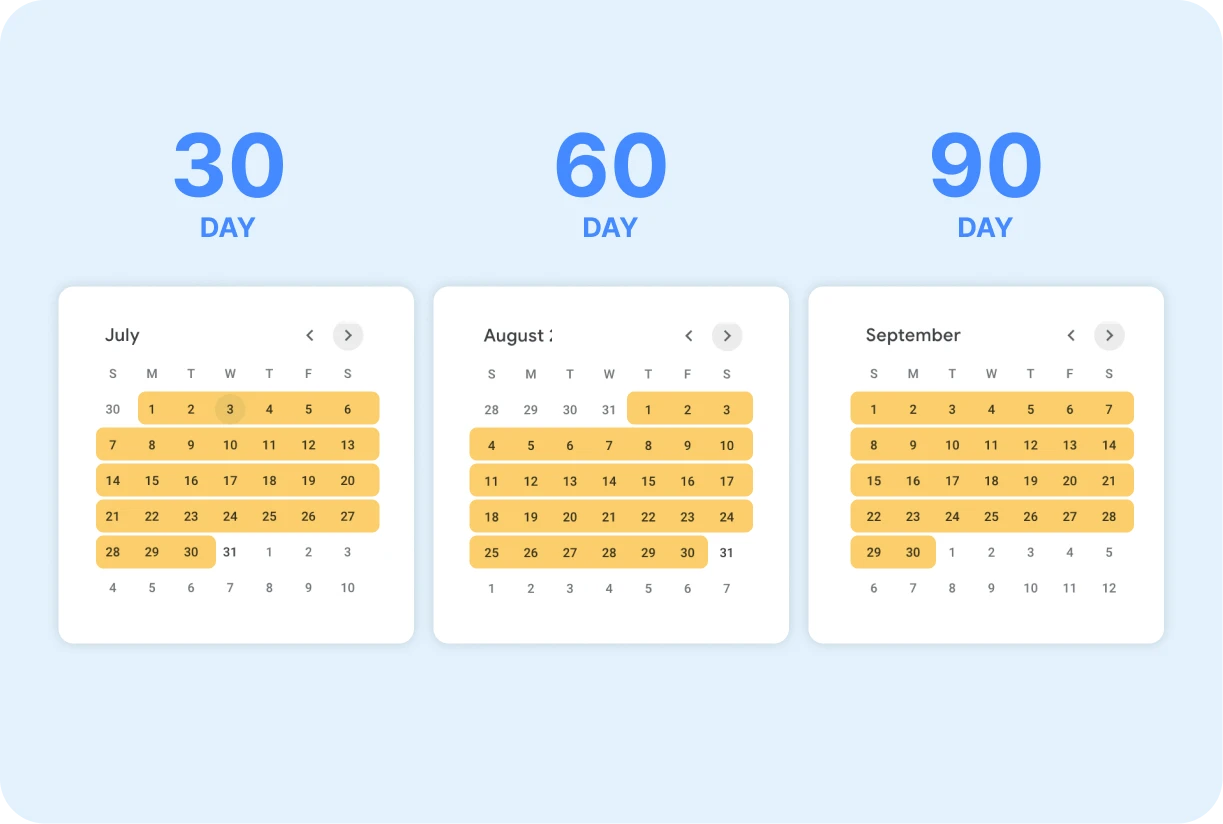
Now that you’ve done your market research and your mind is buzzing with ideas, your next order of business is to structure those ideas in a business plan.
A business plan will help you clarify your business objectives and goals, plus map out a plan toward a thriving party rental business. It’ll also help you pinpoint any challenges you foresee, keep you on track with a timeline, and start to outline a path toward profitability.
Check out our 30-60-90 day business plan template and checklist to get started.
Here are the four foundational parts of a successful business plan:
1. Define company scope
You’ve done the market research and understand the importance of defining your niche — now, add this to your business plan to convey the value of your product and service offerings to potential clients. You want to describe:
- What type of company you are and how you fit into the events industry.
- Who your target market is: Not just the consumer, but also the event type — brides and grooms for weddings? Company party planners for corporate events? Parents of teens celebrating a mitzvah or sweet 16?
- Your competitive advantage: What sets you apart from competitors, and why is it important to clients?
- The team members you need: Delivery drivers? Salespeople? A web designer?
Once you determine who your target market is, make sure it aligns with the demand in the area. You may have the perfect idea for a wedding rental business, but if your area has an older demographic with lower statistical odds for getting married, it may not do well — even if your idea is stellar.
On the flip side, you may want to start a premier tables and chairs business. If you don’t do a market analysis and examine the competitors in your area, you may end up launching a company that’s drowned out by a sea of long-standing businesses.
Not completing a marketing analysis can mean lots of time and money down the drain — put in the work now to avoid heartache in the future.
2. Products and services you’ll offer
In this section, you’ll outline the products and services you offer. This can be broken down into a few different parts:
- Products: Will you offer vintage rentals and florals? All-in-one tents and tables?
- Services: How about services, like standard delivery and pickup, or more specialty services like DJs or casino game dealers?
- Packages: How are you planning on utilizing packages?
- Pricing: What will your pricing structure look like?
The products and services section of your event rental business plan should outline all of this information. In addition, you’ll also want to tie this section into your market analysis. What demand are you solving for with specific inventory items or packages?
3. Financial information and startup costs
If you’re starting a company from the ground up, you should include your operating budget and a break-even analysis. What costs do you plan on incurring, and how will you mitigate these?
If you start a party rental business from home, you’ll immediately save on storage costs, but what will the cost of outgrowing your home be? If you’re seeking funding, you’ll also want to include the amount of cash you need and how you plan to use it over a given amount of time.
Cash planning is crucial. Knowing how much revenue you expect and what your expenses are each month allows you to make smart investment decisions, weather the off-season, and stay on-track with your budget.
Learn more about creating a party rental pricing strategy.
4. Potential challenges and obstacles
Finally, you need to account for any potential risks you see as a threat to your success. Is it competitors? Is it inclement weather in your area? Are you trying to break into a tough, well-established market?
Think through all the possible challenges you’ll face as a new event company and write them down. Then, brainstorm potential solutions. The name of the game is preparation — you want to do everything you can at the beginning to prepare for the worst (while hoping for the best).
Adaptability is key in the events industry.
4. Where should you create your party rental business plan?
We recommend creating your business plan in a digital format because it’s 1) protected and less likely to get lost, 2) instantly accessible, especially if it’s stored online, and 3) easily shareable, making it a breeze to send to anyone who may need it.
Start your journey towards becoming a thriving, profitable business with these event rental business plan templates and easy-to-follow checklists.Event Company Business Plan [Free Template]
Network with Other Event Professionals and Join Industry Organizations

Earlier we mentioned NACE (the National Association for Catering & Events). Building authentic, meaningful connections with other event entrepreneurs is an important step in building a successful event business — and organizations like NACE can help you get there.
So many event professionals regret not finding a mentor or peers when they started. The best way to do this is by networking with fellow event pros and joining industry organizations. Attend local happy hour networking events, join relevant Facebook groups (like ARA Event Rentals or Party Rental Knowledge Group), or even travel to bigger trade shows.
After all, your industry peers have a wealth of knowledge to share, and have made mistakes that you’ll be eager to avoid. Any true pro knows the meaning of “community over competition.”
Check out our ultimate guide to event industry associations and trade shows.
Sort Out All of Your Legal Business
 The legal side of things may not be the most exciting part of starting a party rental business, but it’s necessary — and often overlooked. The last thing you want is to get in trouble with the tax man.
The legal side of things may not be the most exciting part of starting a party rental business, but it’s necessary — and often overlooked. The last thing you want is to get in trouble with the tax man.
Register for business licenses and permits
Every party rental business needs to have proper licenses and permits before they can legally operate. The consequences if you don’t can be steep: Hefty fines or even business shut-downs.
Most jurisdictions don’t have permits specific to party rental businesses. But they’re still required to check country, state, and local laws to ensure full compliance. If your party rental business is based in the U.S., you can apply for the relevant licenses and permits here.
Sort out taxes
Now for the next order of business: Taxes. Tax rules vary from state to state and county to county, and it’s always best to start by consulting a tax pro who knows the laws of your region. Beyond that, here are several key steps to staying on Uncle Sam’s good side:
1. Choose your business structure
- Sole proprietorship: Simple, but you and your business are one (not great for liability).
- Partnership: You and your business partners share responsibilities and taxes.
- LLC: Limited liability with flexibility in taxation.
- Corporation: More complex, but separates you legally from your business.
- S Corporation: Tax benefits if you qualify, but with restrictions.
2. Get an EIN (or roll with your SSN)
- Apply for an Employer Identification Number (EIN) from the IRS. Think of it as a Social Security number for your business. You can get it free online here via the IRS website.
- If you don’t have an EIN yet, that’s okay — you can always get your business off the ground with your Social Security Number (SSN) and apply for an EIN at a later date.
3. Register with state and local agencies
- Register your business with your state’s tax agency. Rules and requirements vary, so check your state’s specific needs.
- Local licenses might be required too. Your city or county clerk’s office will have the scoop.
4. Know your tax types
- Income tax: All businesses pay this, but how much and how it’s calculated varies by structure.
- Self-employment tax: If you’re self-employed, plan to pay this for Social Security and Medicare.
- Payroll taxes: If you have employees, you’re on the hook for withholding and paying these.
- Sales tax: If you sell goods or services, you might need to collect this from customers.
- Property tax: Own property? You’ll pay this based on your location and property value.
5. Set up your accounting system
- Use software like Quickbooks Online or hire a pro to track income, expenses, and taxes. This keeps your financial ducks in a row and makes tax filing a breeze.
6. Understand your filing obligations
- Quarterly estimated tax payments might be required. The IRS doesn’t like surprises, so keep them happy with regular payments.
- Annual returns for federal and state taxes are a must. Deadlines vary, so mark your calendar.
Bonus tips:
- Consult a tax pro: Starting out with expert advice can save you headaches (and money) down the road.
- Keep up with tax law changes: Consider hiring a tax professional to help navigate the ever-changing rules and ensure you’re in compliance.
- Keep records: Maintain detailed records of all financial transactions and tax documents for at least seven years.
Get party rental insurance
We’re not here to provide you with legal advice, but we will say this: You can get in real trouble if you don’t have the proper insurance for your company.
Take general liability insurance, the most important type of insurance to have. In addition to protecting you against lawsuits from customers, most major venues and organizations will only rent from an event rental business who’s covered by insurance.
Once you’ve got your general liability insurance, you should also look into other types your business may need, including:
- Commercial property insurance: Commercial property insurance for your party rental business ensures coverage for your physical assets, like tents, tables, and chairs, protecting them from damage or loss due to events such as fire, theft, or vandalism.
- Commercial auto insurance: Commercial auto insurance is essential if you use vehicles for delivery or transportation of rental equipment, providing protection for your company vehicles against accidents and liability for any injuries or damages caused.
- Inland marine insurance: Inland marine insurance covers your rental inventory while it’s in transit or stored at off-site locations, safeguarding your equipment against loss or damage during transportation to and from events.
- Workers compensation: Workers compensation insurance is crucial for your employees’ well-being, providing medical benefits and wage replacement if they’re injured on the job while setting up or dismantling rental equipment.
- Commercial umbrella insurance: Commercial umbrella insurance offers additional liability coverage beyond your primary policies, protecting your business from potentially costly lawsuits arising from accidents or injuries at events.
- Business interruption insurance: Business interruption insurance helps cover lost income and ongoing expenses if a covered event, like a fire or natural disaster, disrupts your ability to operate, allowing you to continue paying bills and employees during the downtime.
- Multinational coverage: Multinational coverage is vital if your party rental business operates internationally, ensuring compliance with local regulations and providing insurance solutions tailored to the specific risks of each country you operate in.
We 100% recommend consulting a lawyer on insurance, as it can be difficult to parse through on your own.
Learn more about the basics of party rental insurance.
Have a lawyer review your materials
Get off on the right foot legally by getting a lawyer to review your branding, insurance, damage waivers, contracts, and more. This will protect you, your business, and your clients from the start.
The First Month Checklist: Get Your Business Up and Running
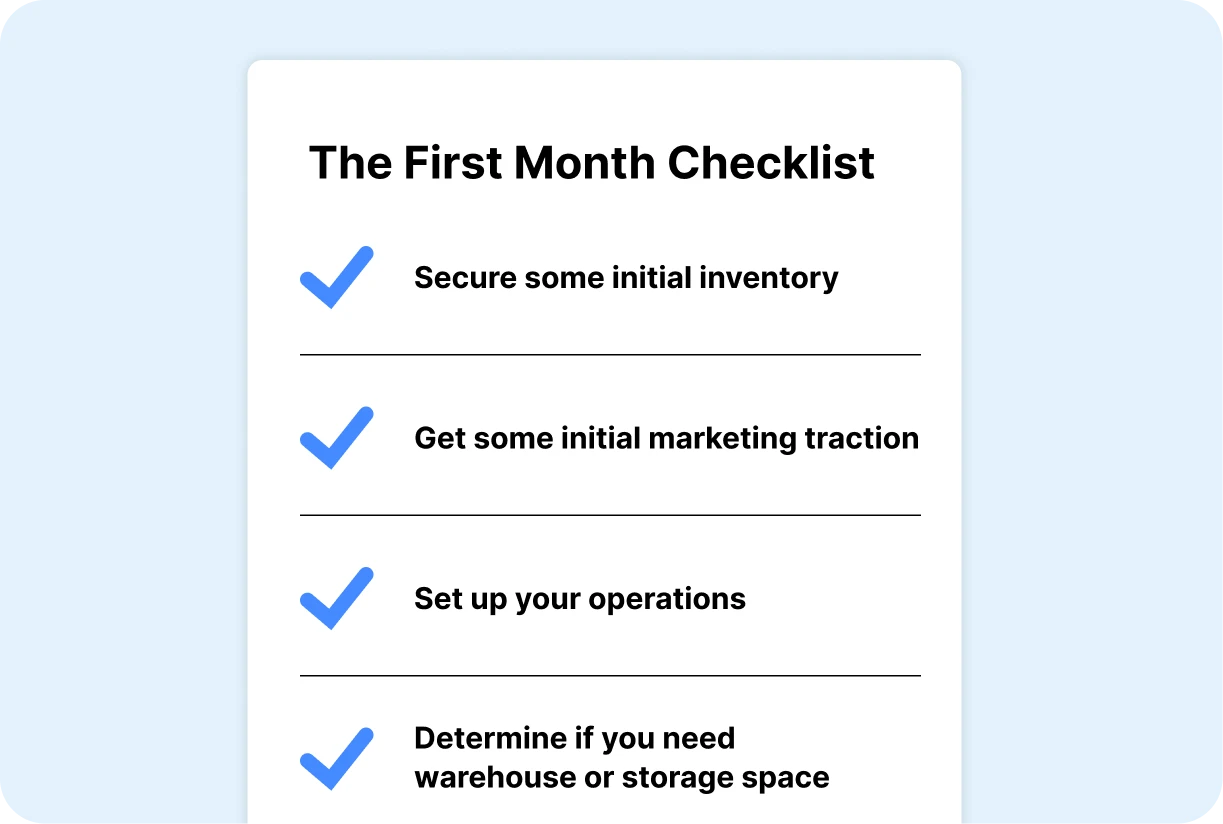 So you’ve got your business plan in place and your legal business in check. Congrats! It’s time for your first month in the party rental business.
So you’ve got your business plan in place and your legal business in check. Congrats! It’s time for your first month in the party rental business.
The first month will no doubt be a busy one. Instead of playing a game of whack-a-mole with tasks that will inevitably emerge, we recommend sorting through the following to-dos right off the bat:
Secure some initial inventory (and collect information on inventory demand)
Before you officially launch your event rental business, you need to have items to rent out. You don’t need all the bells and whistles right away — the basics, like tables and chairs, are a great starting point. This will get you started with a few small, simple events.
Be careful of trends, too. Trendy inventory items can be wallet-draining when they go out of style sooner than expected.
Read more about where to buy event inventory, plus the best ways to manage and track your inventory.
Our favorite tip at this stage is to collect data on inventory demand. That may sound intimidating, but it’s actually quite simple. You can get cash flow going by showcasing inventory on your website immediately — even if you don’t have it in stock yet.
If you know when the inventory you ordered is expected to be delivered, you should:
- Purchase an inventory management software like Goodshuffle Pro
- Integrate your website with your software
- Add a disclaimer to your website for when your items should arrive. For example, “New items renting Fall 2024.”
Many events book in advance, so if you wait until your inventory is in stock, it could be another 4-6 months before people start booking. If you get your rentals up on your site right away, then you can start collecting deposits for items well in advance, get cash flowing, and have events on the books right away for when your inventory does arrive.
If you want to go a step further, you can also advertise inventory on your site before you even purchase it, to see if potential clients are interested. This helps you see which items are worth heavy investment. Just don’t forget to add in the item description that the item may not be available for a few weeks — you don’t want to set unrealistic expectations.
Get some initial marketing traction
Of course, your fantastic new inventory items won’t be leaving storage unless people know you exist. You can get your start by calling up friends, family, and business acquaintances. But in the medium and long term, you’ll need to spend some time on marketing your party rental business.
Your first order of marketing business should be creating an online presence for your business, since the majority of shoppers explore a brand’s page before doing business with them.
A 2021 report by Sprout Social found that a third of consumers use social media to “learn about or discover new products, services or brands. Additionally, one in four also use social media to purchase products.”
We recommend starting with:
- Social media accounts: Facebook, Instagram, and Google Business Profile are quick to set up and are a great place to show behind-the-scenes pictures and videos to build anticipation for your party rental business. They’re also easy to share with potential customers.
- Website: Your website is your digital showroom, which gives potential clients a sneak peek into what you offer. Building a website doesn’t have to be difficult either. It’s all about choosing the right website builder for your business.
There’s a lot that goes into building a lead-generating online presence. Lots of event professionals have questions like, “Should I hire a developer?” or “What platform should I host my website on?”
For answers to these questions and more, read our ultimate guide on how to build the best website for your event business.
Want more bookings?
Take our free quiz to get a custom marketing game plan in minutes.
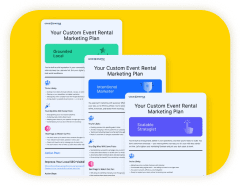
Set up your operations (and begin documenting SOPs)
How will you avoid double-booking inventory items? How will you accept payment? How will you organize your calendar? Or keep on the same page as those you’re working with?
When you first start out, it might be easy to keep all of this information in your head. But as you grow, things will inevitably slip between the cracks without proper processes and documentation. Keeping track of customers, event dates, and inventory items is a huge task.
For Kevin Dennis of Fantasy Sound Event Services, having all of the contact information for your creative partners in one place is a huge timesaver, and it can help to avoid any hiccups on the day of.
Standard operating procedures, or SOPs, are critical for creating a solid foundation for your event business. They outline the best method for completing a process, and are useful for getting all collaborators on the same page. They also help you to remember how you do a certain task, since you’re likely working on lots of things all at once.
SOPs will come in handy when you encounter things like inclement weather, damaged inventory, non-responsive clients, and more — things every event professional will encounter at least once.
Check out the top 5 SOPs for event pros.
Determine if you need warehouse or storage space
Storing event rental inventory can be a challenge, especially for new event professionals.
You might want to start a party rental business from home, garage, or shed. That’s perfectly okay. If you have the means, you may consider investing in a larger storage space or warehouse.
If inventory gets lost or buried within your space, you aren’t making money on it. This is why inventory tracking software for event companies is one of the best investments you can make for your inventory’s return on investment. The ability to effectively manage inventory will be crucial to your event rental business.
Learn more in our guide to effective event rental inventory management.
Decide how you will transport items
Lastly, you may want to consider investing in trucks or trailers to transport all your inventory to and from jobs. You may be okay doing without them for now, but as you grow, this investment will save you money in the long run.
Use Event Rental Technology to Grow Your Event Rental Company
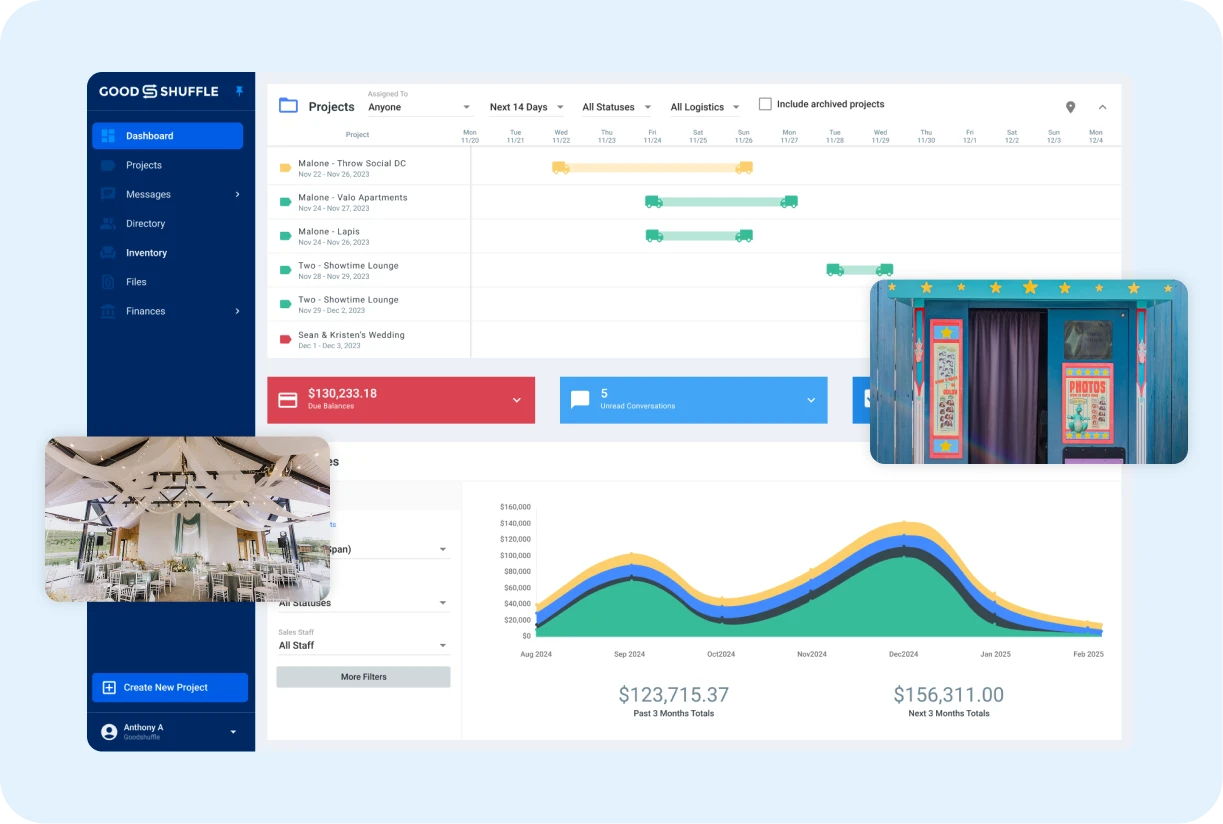 When starting out, many event professionals understandably want to save as much money as possible. But many experienced professionals tell us they wish they’d spent the money on software upfront, to save money down the line.
When starting out, many event professionals understandably want to save as much money as possible. But many experienced professionals tell us they wish they’d spent the money on software upfront, to save money down the line.
As a new business owner, your time is money. Do you ever feel like you’re wasting time doing repetitive tasks like building quotes, or copying and pasting between systems? Unsure how to find and win qualified leads online? Consistently chasing clients to get them to pay?
If you’re spending hours upon hours working through tedious activities, event rental software could be a life-saver — especially as you grow your team and your business.
When you decide it’s time to hire, check out our 17 free job description templates for event companies.
Goodshuffle Pro has everything you need to successfully start an event rental business, including highly effective features such as:
- Photo-driven proposals and quotes you can build in minutes
- A powerful Website Integration to drive online business
- Electronic signatures for speedy payments
- Easy inventory tracking, management, and reporting
- Integrations with QuickBooks Online and Google Calendar to keep your finances in order and your events on schedule
There’s no better time than now to start your journey towards profitability and success.
Just take it from Cam Petty, Founder & CEO of Render Events, a Dallas-based creative firm. She estimates using Goodshuffle Pro saves her team a whopping 1,500 hours per year.
